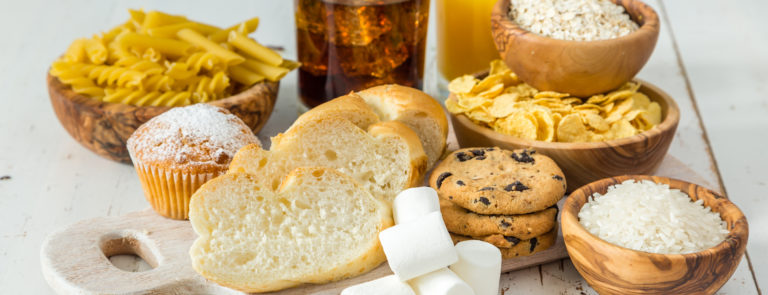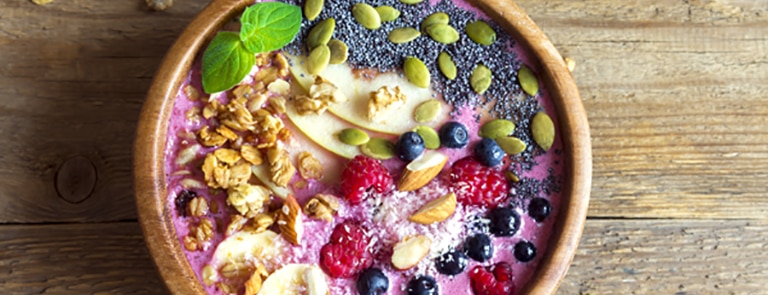10% off £35
Code:SAVE
The anti-ageing nutrients you need right now

Your diet can play a big part in how your body ages. Getting older is inevitable, but adding these anti-ageing nutrients to your diet can help you feel younger for longer.
Getting older is inevitable, but changing your diet can help you feel younger for longer
It’s not the secret of eternal youth, but eating a healthy balanced diet can help your body remain healthy for as long as possible. What you eat can even help slow down the ageing process, from maintaining good vision to boosting brain power.
Which nutrients do you need?
Experts often recommend following a Mediterranean diet – rich in olive oil, fresh veg, wholegrains and lean protein – for optimum health. It has been linked to improved ageing outcomes, including better physical and cognitive function.1 But there are some specific nutrients that can help protect your body and brain as you get older.Protein
We lose up to 8% of our muscle mass every decade after turning 30, but eating protein could help reverse this. A US study following 2000 elderly people over three years found those who ate the most protein saw up to 40% less muscle decline.2Find it in: Tofu, legumes and pulses, meat, soya, quinoa.
Handpicked content: Here’s why your body loves protein (and how you can get enough of it)
Lutein
Our vision can decline as we age, but a number of nutrients can help keep our peepers healthy – especially lutein. This antioxidant is found naturally in the macular at the back of the eye, where it limits oxidative damage, but levels plummet over time. A 1994 Harvard University study found consuming 6mg of lutein a day led to a 43% lower risk of macular degeneration.3 Find it in: Leafy green veg such as kale, spinach and broccoli.Handpicked content: What can I do with kale?
Omega-3 fatty acids
Omega-3s may help keep your brain sharp. A study published in the American Journal of Clinical Nutrition in 2007 found that elderly men consuming larger amounts of fatty acids EPA and DHA had less cognitive decline after five years.4 Who says fish have a bad memory?! Find it in: Oily fish such as mackerel, salmon and sardines, flaxseeds, chia seeds.Calcium
Women can lose up to 5% of their bone density in the seven years following menopause.5 This is due to a drop in female hormone oestrogen, which helps bones retain vital minerals. But getting enough calcium may help bones stay strong. Researchers from Dongduk Women's University in South Korea found those who consumed a diet that contained enough calcium also had the lowest risk of developing osteoporosis.6 Find it in: Milk, cheese, leafy veg, nuts and seeds, dried fruit.Handpicked content: Your natural menopause solutions
Vitamin D
Research suggests the sunshine vitamin slows down ageing at a cellular level. In a study of 2000 women, scientists from King's College London examined the length of telomeres, the genetic material 'capping' DNA strands. Those with the highest vitamin D levels had longer telomeres, giving them a physical age of five years younger.7Find it in: Daylight, eggs, fish, fortified spreads and cereals.
Handpicked content: How to get more Vitamin D in your day
Co-enzyme Q10
Needed for energy production, co-Q10 also protects against cellular damage. But our natural levels nosedive as we age, which can lead to fatigue. Evidence shows that low co-Q10 levels may also play a part in cardiovascular conditions and dementia too. Upping your intake has also been found to help ward off wrinkles.8Find it in: Wholegrains, eggs, meat, fish.
Shop our Vitamins and Supplements range
Vitamin C
Want to fight fine lines? Try getting more vitamin C. This antioxidant vitamin helps protect skin from damaging free radicals, and is also needed to build collagen (the skin’s elastic fibres). A 2007 study published in the American Journal of Clinical Nutrition reported 'higher vitamin C intakes were associated with a lower likelihood of a wrinkled appearance'.9 Glass of OJ, anyone? Find it in: Oranges, kiwis, strawberries, broccoli, tomatoes.Advice is for information only and should not replace medical care. Please check with your GP before trying any remedies.
1. Science Daily: Can a Mediterranean diet pattern slow aging? Available from: https://www.sciencedaily.com/releases/2018/03/180330145322.htm 2. Houston DK, et al. Dietary protein intake is associated with lean mass change in older, community-dwelling adults: the Health, Aging, and Body Composition (Health ABC) Study. Available from: https://www.ncbi.nlm.nih.gov/pubmed/18175749 3. AMDG. Lutein for preventing macular degeneration. Available from: https://www.macular.org/lutein 4. Van Gelder BM, et al. Fish consumption, n-3 fatty acids, and subsequent 5-y cognitive decline in elderly men: the Zutphen Elderly Study. Available from: https://www.ncbi.nlm.nih.gov/pubmed/?term=Van+Gelder+et+al.+Am+J+Clin+Nutr+2007%3B85%3A1142-7 5. NHS. Menopause and your bone health. Available from: https://www.nhs.uk/live-well/healthy-body/menopause-and-your-bone-health 6. Yang YJ and Kim J. Factors in relation to bone mineral density in Korean middle-aged and older men: 2008-2010 Korea National Health and Nutrition Examination Survey. Available from: https://www.ncbi.nlm.nih.gov/pubmed/24851837 7. Ian Sample, The Guardian: Ageing process may be slowed by vitamin D, say scientists. Available from: https://www.theguardian.com/science/2007/nov/08/sciencenews.medicalresearch 8. Healthbox. How co-Q10 could slow the signs of ageing. Available from: https://www.hollandandbarrett.com/the-health-hub/co-q10-slow-signs-ageing/ 9. Cosgrove MC, et al. Dietary nutrient intakes and skin-aging appearance among middle-aged American women. Available from: https://academic.oup.com/ajcn/article/86/4/1225/4649573
Related Articles
Shop by wellness goal
Sign up for exclusive offers
Plus, get expert advice to support your health & wellness straight to your inbox when you sign up to Holland & Barrett emails.
Read our
privacy policy














